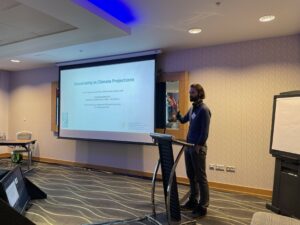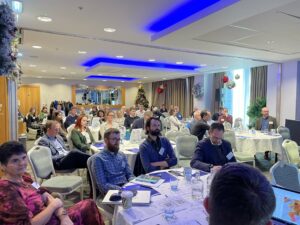The National Framework for Climate Services (NFCS) this week hosted a workshop on Addressing Climate Uncertainty, catering for a cross-section of stakeholders from academia, government agencies, and the private sector.

Dr Markus Todt speaks at the NFCS workshop on Addressing Climate Uncertainty
Chaired by Met Éireann, the NFCS coordinates collaboration between climate information providers and users, in order to facilitate the creation of user-driven climate services.
The main aims of the workshop were to explore strategies for integrating uncertainty into climate-related decision-making and adaptive planning, and to discuss best practices to communicate this uncertainty.
Through expert presentations and collaborative discussions, the event set out to provide an enhanced understanding of the sources of climate uncertainty, as well as practical tools to address these uncertainties.
The workshop focused on fostering resilience by embracing uncertainty, enabling participants to address climate risks while balancing long-term sustainability goals across different sectors.
Following on from an opening address by Met Éireann’s Head of Climate Services, Keith Lambkin, the first presentation from Met Éireann colleague, Dr Markus Todt, looked at ‘Sources of Climate Uncertainty’. This ‘in-depth’ talk provided the basis for the day, outlining both the sources of climate uncertainty, as well as how wide the envelope of uncertainty can actually be.
International expert perspectives were provided by Grantham Professor of Climate Science in the Meteorology Department at the University of Reading, Prof Ted Shepherd, and Professor of Climate Literacy at the Amsterdam University of Applied Sciences (AUAS), Prof Janette Bessembinder, who discussed the respective topics of decision-making and tailoring climate data under uncertainty.

Attendees at the NFCS workshop on Addressing Climate Uncertainty
Further talks followed from Irish Climate Change Advisory Council (CCAC) Resilience Team Lead, Stephen Flood on ‘Practitioner Needs to Support Decision-making’ and from Environmental Protection Agency (EPA) Senior Manager for Climate Services, Dr Conor Quinlan (EPA), on ‘The Role of the National Climate Change Risk Assessment in Decision-making for Adaptation’, before UCC’s Prof Paul Holloway presented a case study from the Met Éireann-led TRANSLATE project.
The final group exercise tasked the more than 60 participants to explore and propose solutions to real-world challenges tied to climate uncertainty in Ireland, focusing on critical aspects of climate services such as data gaps, communication challenges, and predictive uncertainty.
In drawing the meeting to a close, Met Éireann’s Dr Claire Scannell said, “The day was extremely successful in starting a national conversation around climate uncertainty. This is the first step in ongoing efforts by the NFCS to coordinate and inform meaningful discussions around the topic of climate uncertainty within the climate services community in Ireland. We look forward to many more collaborative meetings like this one. Our sincere thanks to many sectors who so actively contributed”.
For more on the NFCS, visit the landing page.